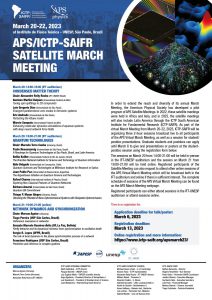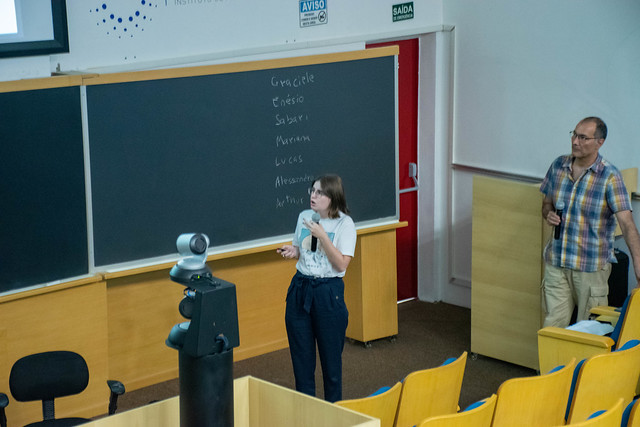APS/ICTP-SAIFR Satellite March Meeting
March 20-22, 2023
ICTP-SAIFR, São Paulo, Brazil
Auditorium of IFT-UNESP
Home
In order to extend the reach and diversity of its annual March Meeting, the American Physical Society has developed a pilot program of APS Satellite Meetings. In 2022, these satellite meetings were held in Africa and Asia, and in 2023, the satellite meetings will also include Latin America through the ICTP South American Institute for Fundamental Research (ICTP-SAIFR). As part of the virtual March Meeting from March 20-22, 2023, ICTP-SAIFR will be organizing three 2-hour sessions broadcast live to all participants of the APS Virtual March Meeting, as well as a session for student/postdoc presentations. Graduate students and postdocs can apply until March 6 to give oral presentations or posters at the student-postdoc session using the registration form below.
The sessions on March 20 from 14:00-21:00 will be held in-person in the IFT-UNESP auditorium and the session on March 21 from 19:00-21:00 will be held online. Registered participants of the Satellite Meeting can also request to attend other online sessions of the APS Virtual March Meeting which will be broadcast both in the IFT auditorium and online if there is sufficient interest. The complete schedule of sessions of the APS Virtual March Meeting can be found on the APS March Meeting webpage
Registered participants can either attend sessions in the IFT-UNESP auditorium or attend sessions online. To help accomplish the goal of extending the reach and diversity of the March Meeting, there is no registration fee for in-person or online participation in the APS/ICTP-SAIFR Satellite Meeting.
Condensed Matter Theory
Session Date/Time/Place: March 20, 14:00 – 16:00 (Brazil time), IFT auditorium
Chair: Alexandre Reily Rocha (IFT-UNESP, Brazil)
Live streaming: https://www.youtube.com/watch?v=zdSeO3tnsM4
14:00-14:30 Gustavo Martini Dalpian (Universidade Federal do ABC): Tuning spin splittings in 2D compounds
14:30-15:00 Luis Gregorio Dias (Universidade de São Paulo): Emergent parafermionic zero modes in fermionic systems
15:00-15:30 Eric Andrade (Universidade de São Paulo): Perturbing the Kitaev model
15:30-16:00 Márcio Sampaio (Universidade Federal do ABC): Enhancing molecular dynamics simulations of aqueous systems with deep neural network force fields
ICTP-SAIFR Student-Postdoc session
16:30 Graciele Martins Arvelos (UFABC): Vibrational properties of water layer adsorbed on Au(111) under a bias potential
16:45 Enésio Marinho Jr. (IFT-UNESP): Photovoltaic efficiency of bulk transition metal dichalcogenides by ab-initio excited-state methods
17:00 Sabari Subramaniyan (IFT-UNESP): Study of quantum turbulence in dipolar BECs by circularly moving laser
17:15 Mariana Storrer (UFPR): Theory-Independent Context Incompatibility
17:30 Lucas Medeiros Ruela (IFGW/Unicamp): Fabrication and Measurement of Transmon-Type Superconducting Qubit
17:45 Alessandro Silva Santana (IFGW/Unicamp): Quantum entanglement characterization using metamaterial circuits
18:00 Arthur Oliveira (Unicamp – IMECC): State-independent contextuality in a multiple observers setup
- William de Castilho (IFUSP): Spherical model with Dzyaloshinskii- Moriya interactions
- Cristhian David Hinostroza Vargas Machuca (IFUSP): Thermal stability of the β-phase in the topological insulator Bi4I4
- Laura Freneda de Oliveira (UNESP): Dynamic multipolar polarizabilities of hydrogen-like atoms: a second order varionational perturbative method in the description of the Ba+
- Lui Zuccherelli de Paula (IFUSP): Sistema de dois qubits sob medição quântica contínua acoplados a banhos térmicos
Quantum Technologies
Session Date/Time/Place: March 20, 19:00 – 21:00 (Brasilia time), IFT auditorium
Chair: Marcelo Terra Cunha (Unicamp, Brazil)
Live streaming: https://www.youtube.com/watch?v=zdSeO3tnsM4
Network Dynamics and Synchronization
Session Date/Time: March 21, 19:00 – 21:00 (Brasilia time), online
Chair: Marcus Aguiar (Unicamp, Brazil)
Live streaming: https://www.youtube.com/watch?v=3TLeBq2RdUA
Presentation 1: 19:30 – 20:00
Tiago Pereira (USP São Carlos, Brazil): Coherence resonance in networks
Abstract: Complex networks are abundant in nature and many share an importante structural property: they contain a few nodes that are abnormally highly connected (hubs). Some of these hubs are called influencers because they couple strongly to the network and play fundamental dynamical and structural roles. Strikingly, despite the abundance of networks with influencers, little is known about their response to stochastic forcing. Here, for oscillatory dynamics on influencer networks, we show that subjecting influencers to an optimal intensity of noise can result in enhanced network synchronization. This new network dynamical effect, which we call coherence resonance in influencer networks, emerges from a synergy between network structure and stochasticity and is highly nonlinear, vanishing when the noise is too weak or too strong.
Presentation 2: 20:00 – 20:30
Gonzalo Marcelo Ramírez-Ávila (IIF, La Paz, Bolivia): Firefly behavior and its dynamical richness: from synchronization to oscillation death
Fireflies are fascinating insects from a physical viewpoint. Thus, numerous physical phenomena are involved in the understanding of their flashing. Firefly synchronization is the first observed natural phenomenon displaying such behavior in large ensembles. Nowadays, it constitutes a paradigmatic example of synchronization associated in several firefly species with mating behavior. Interestingly, in terms of functionality, male synchronization is only the first step in the courtship, followed by a response from the females. The explanation of both mating steps can be described in terms of dynamical systems modeling whose equations are obtained from experimental results of the interaction of some automata denominated as electronic fireflies or, more technically, light-controlled oscillators (LCOs). A review of the principal attempts to build models that explain how and why fireflies synchronize is given in [1, 2]. The talk explains the experimental aspects related to LCOs, the construction of the model and its application to describe the phenomena of male synchronization, and the female response to synchronization. Furthermore, the oscillation death phenomenon in strongly coupled fireflies is also described.
[1] G.M. Ramírez-Ávila, J. Kurths, J.L. Deneubourg, Fireflies: A Paradigm in Synchronization, in: M. Edelman, E.E.N. Macau, M.A.F. Sanjuan (Eds.) Chaotic, Fractional, and Complex Dynamics: New Insights and Perspectives, Springer International Publishing, Cham, 2018, pp. 35-64.
[2] G.M. Ramírez-Ávila, J. Kurths, S. Depickère, J.-L. Deneubourg, Modeling Fireflies Synchronization, in: E.E.N. Macau (Ed.) A Mathematical Modeling Approach from Nonlinear Dynamics to Complex Systems, Springer International Publishing, Cham, 2019, pp. 131-156.
Presentation 3: 20:30 – 21:00
Sergio R. Lopes (UFPR, Brazil): The role of local dynamics in the phase synchronization process of a network
Abstract: Partial phase synchronization, also reported as neuron cooperation, is a pivotal behavior of the brain and related to its main features, such as memory. The excess or even the lack of phase synchronization are associated with brain disorders like epilepsy and Parkinson’s disease. These diseases may be related to malfunctioning of the synchronization process of the neurons, triggered by changes of the local dynamics of the neurons influenced by parameters such as the ion-channel conductance. In fact, it is common the use of drugs to block or activate specific channels, changing the conductance and bringing the synchronization process to some desired behavior. We report here how individual characteristics of the local dynamics of the neurons, such as their linear stability, when coupled in a network may be a fundamental player in the phase synchronization process as a function of the coupling strength. Global and small-world topologies are considered. For both coupling schemes, the effects of the local dynamics are clear, inducing early or retarding the occurrence of partial phase synchronization of the network when the coupling strength is varied. In this scenario, we discuss the effect of the local dynamics of the neuron, showing it may be of fundamental importance to understand and control the process of the network phase synchronization. The study also brings useful information to the general understanding of network-phase-synchronization processes.
Presentation 4: 21:00 – 21:30
Francisco Rodrigues (USP São Carlos, Brazil): Prediction and inference in complex systems
Abstract: Complex systems are made up of discrete parts that interact and form a network. The functioning and evolution of these systems depend on the network’s structure. For example, infectious diseases spread due to the connections between individuals. Our brain synchronizes according to the structure of connections between neurons. Since network structure affects these dynamic processes, we can use statistics and machine learning methods to make predictions and inferences about dynamic variables. In this talk, we will discuss how to predict dynamic processes, such as epidemics and synchronization, and infer the influence of the network on such processes.
Registration
Videos and Files
Photos
Additional Information
Poster presentation: Participants who are presenting a poster MUST BRING A BANNER PRINTED. The banner size should be at most 1 m (width) x 1,5 m (length). We do not accept A4 or A3 paper. Click here to see what a banner looks like: http://designplast.ind.br/produtos/detalhe/impressao-digital/banner/119/9
How to reach the Institute: The program will be held at ICTP South American Institute, located at IFT-UNESP, which is across the street from a major bus and subway terminal (Terminal Barra Funda). The address which is closer to the entrance of the IFT-UNESP building is R. Jornalista Aloysio Biondi, 120 – Barra Funda, São Paulo. The easiest way to reach us is by subway or bus, please find instructions here.


